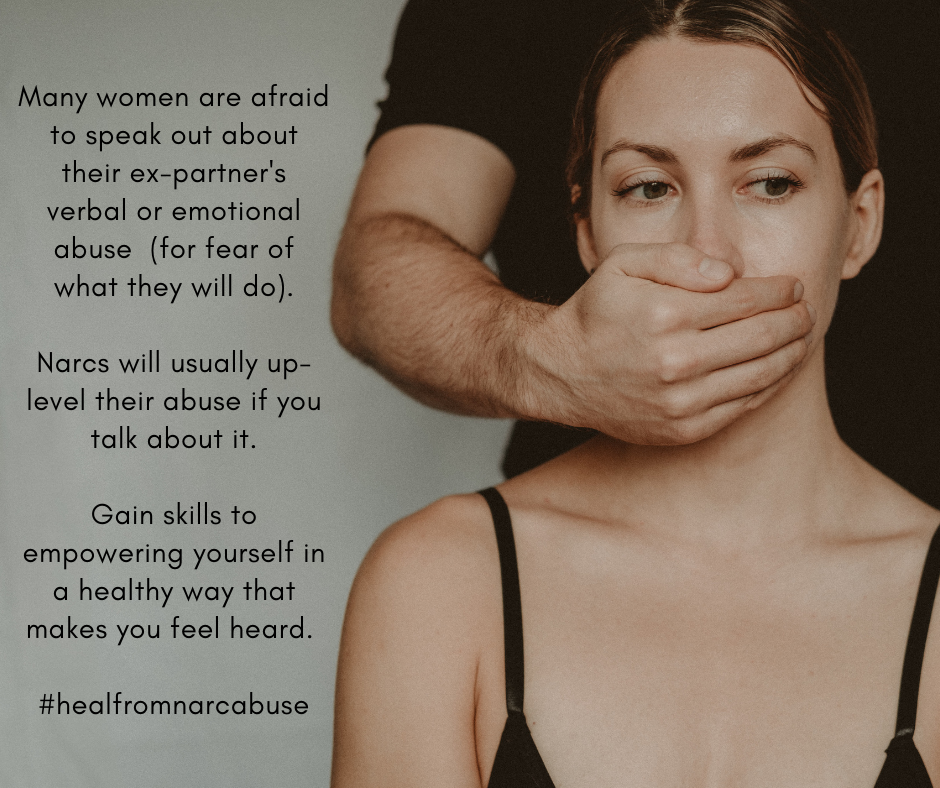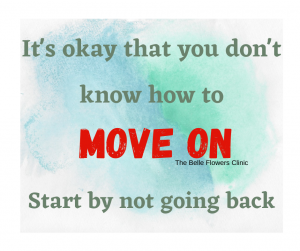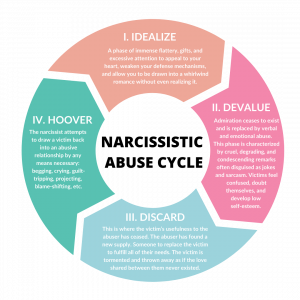
Many women are afraid to speak out about their ex-partner’s verbal or emotional abuse for fear of what they will do. Many times if they catch wind of you talking about their behaviour, they will up their abuse with vicious text rants, email abuse or social media abuse and torments.
It works though – quite often the woman will retreat and hide and suffer alone and in silence.
The whole goal of a person with high narcissism traits is to have control – at all costs. And this includes control of how you think about them, and how you speak about them. If they can silence you, then that is the ultimate control.
When you call them out on their behaviour, it will be vastly different to their own perception. So you may experience verbal reprimands, yelling, gaslighting and re-writing of history.
Signs of verbal abuse
this is taken from mensline.org:
- Yelling: it’s normal for people in relationships to raise their voice or yell every now and then, but ongoing and repeated yelling is cause for concern
- Swearing and name calling: belittling your partner by calling them names, swearing at them, or putting them down
- Demanding or ordering: telling your partner they have to do something and they don’t have a choice
- Threatening or blackmail: telling your partner there will be consequences if they don’t do what you say – e.g. “If you go out with your friends tonight, don’t bother coming back”
- “Gaslighting”: whereby a person is manipulated into questioning their own sanity or perceptions
- Manipulating: saying things to get someone to do what you want, often through guilt, such as “I did this for you” or “if you loved me you’d do this for me”
- Patronising your partner: for example saying “You won’t understand, so I’ll explain this again”
- Blame: always saying it was the person’s fault for “causing” the argument and making you be abusive
- Passing abuse off as a joke: shaming, insulting, swearing or belittling your partner and then saying “I was only joking” or “You’re too sensitive”
- Insulting people, or things, that your partner likes, or their religious beliefs
- Refusing to talk to your partner and blaming them for your silence.
Long term effects of verbal abuse on victims can include low self-esteem, self-doubt, self-harm, and anxiety. Victims may also find it difficult to make decisions and doubt their own ability to communicate.
The end result of verbal and emotional abuse is the disempowerment of the person who is being abused. They will usually retreat, withdraw and give in, because what else can they do? Arguing will end up in them being called the aggressor. Getting angry and defensive will end up in them being told their “too sensitive” or “too aggressive”. Crying will end up in them being told they are “pathetic”. Going to the police will end up in them being told “the police are laughing at you!”
The answer to the madness is to learn how to release your emotional triggers that are always being pushed by the abuser.
Your emotional triggers are sitting right under the surface and are very raw. They have been pushed over and over again, over time, and are very reactive. You will also have trapped many emotions due to your wounded inner child, and also the part of you that believes this is all your fault and you brought it on yourself.
Victim-blaming is very common, which turns into self-loathing and self-hatred. If you are feeling this way, please know that this is just the wounds talking and is NOT TRUE.
You DID NOT cause this, but you CAN STOP THIS cycle from continuing.
What is true about you is that you have some areas to heal relating to resiliency, self-esteem, self love and confidence.
You have some areas to heal around setting boundaries and becoming independent (instead of co-dependent).
You have some areas to heal around internal validation rather than external validation.
Learning to heal after narcissistic abuse is going to be the biggest gift you can give yourself. It will release you from the pattern of putting others before yourself, and for abandoning your own needs. It requires a lot of patience and self-care on your own part to break those limiting beliefs you hold, and to move into better behaviour patterns that support re-empowerment.
I offer 45min Discovery & Empowerment sessions that help people who are beginning to understand narcissistic abuse, to become self-aware and grounded.
This can help you NOT to react to the abuser in your life, and to assert your own needs from a place of clarity.
I will help you come up with a plan to move forward – meeting your own needs and taking your power back.




